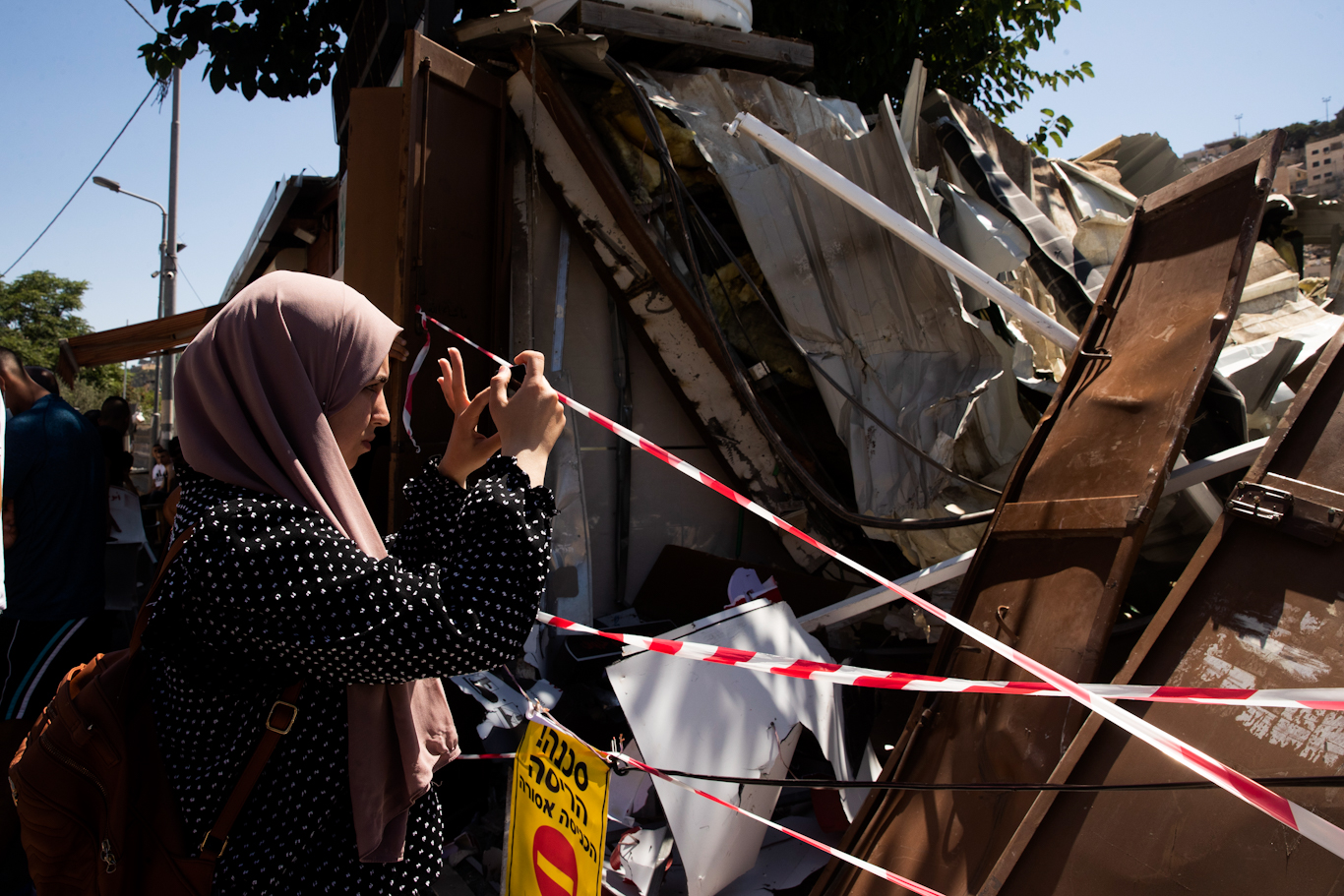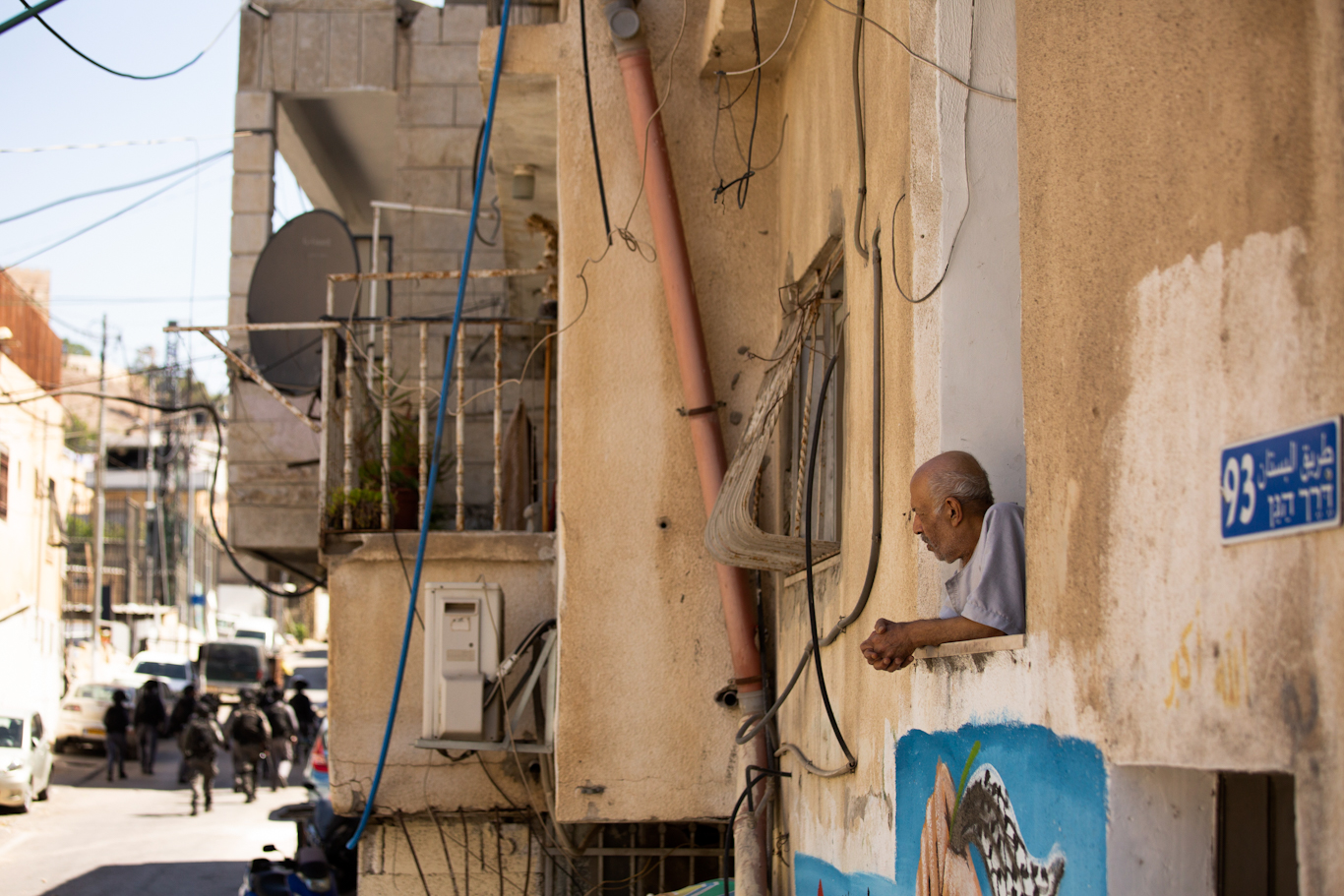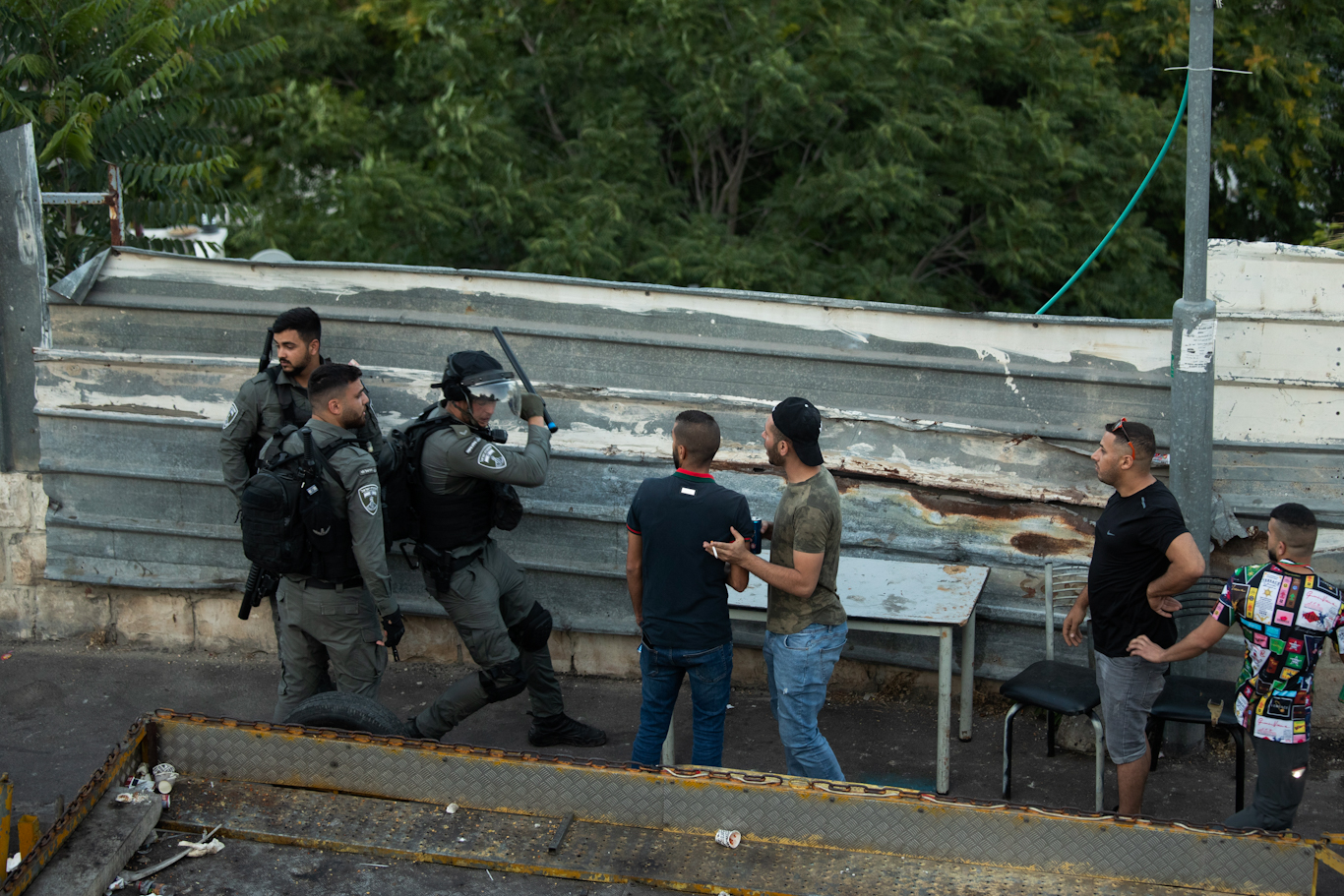American Tax Dollars Financing Israeli Tourist Park Atop Historic Palestanin Neighborhood
At least 1,500 Palestinian residents in Silwan, Jerusalem are at risk of ethnic cleansing in favor of a Jewish tourist park to be established on the site of their historic neighborhood.
July 12th, 2021
OCCUPIED EAST JERUSALEM — Roughly 2.5 miles from Sheikh Jarrah — the Palestinian neighborhood that grabbed the world’s attention in May — lies Silwan. This neighborhood in Occupied East Jerusalem is perched atop the steep slopes just outside the Old City. Houses are tightly compacted and stacked on top of each other as they dip into the valley below. And here, Palestinian residents face the same fate as their brethren in Sheikh Jarrah.
Israeli forces raided the al-Bustan neighborhood in Silwan with bulldozers on June 29 — razing a butcher shop and dispersing Palestinian protesters defending their homes with tear gas, stun grenades, batons and rubber-coated steel bullets. At least 13 people were injured and six arrested including the owner of the butcher shop, Nidal al-Rajabi, and his sons and brothers.
In regard to the recent demolition, Norwegian Refugee Council’s Palestine country director, Caroline Ort, said in a press release, “Under the Fourth Geneva Convention, Israel has an obligation to protect civilians under its occupation and to refrain from destroying private property.”
Al-Rajabi’s store was destroyed on the pretext of lacking a building permit. Various human rights organizations involved in the issue state conflicting numbers, but according to Fakhri Abu Diab, spokesman for Silwan, 16 buildings in al-Bustan are also at immediate risk of being torn down. About 1,500 Palestinians live in more than a hundred houses in al-Bustan.

A woman documents a shop demolished by the Israeli government in Silwan, June 29, 2021. Maya Alleruzzo | AP
On June 7, two structures — including the butcher shop — received notices from the Municipality of Jerusalem to self-demolish their homes within 21 days or municipality authorities would do so and charge the residents the demolition fees, calculated at about $6,000.
Amy Cohen, director of International Relations and Advocacy at Ir Amim, a Jerusalem nonprofit, told MintPress News the second structure, a residential unit, has yet to receive a visit from municipality inspectors. Government officials typically come to a building with a pending demolition order to check whether it has already been demolished by the owners. If not, the inspectors then notify the residents that Israeli authorities will carry out the demolition within days, or even within 24 hours.
Discriminatory housing policies
According to Ir Amim, 68 homes in al-Bustan have pending demolition orders so as to execute the Jerusalem Municipality’s “King’s Garden” plan. The municipality outlined the initiative in 2010, stating:
The King’s Garden area [al-Bustan in Arabic] will be developed into a tourist and residential district. Commercial sections, restaurants, and art galleries will be built, turning it into a bustling tourist zone. For the first time, the local residents will have the legitimate right to live in this neighborhood.
The development plan has not moved forward since 2010, but the municipality’s recent objection to extending the demolition freeze suggests the plan could be reactivated.
In February, the Jerusalem Municipality filed an objection in the Local Affairs Court against al-Bustan residents’ request to extend the demolition freeze, arguing the proposed zoning plan for the area doesn’t follow proper guidelines and isn’t advancing quick enough. In March, the court ruled to extend the demolition freeze until August 15.
Negotiations have been ongoing between the municipality and the residents to develop a suitable zoning plan for al-Bustan since 2005. In 2009, the residents’ plan was rejected by the municipality in favor of the King’s Garden Plan.
According to Murad Abu Shafee, an al-Bustan resident who received a demolition order, the municipality told the residents, “This structure plan can’t happen in Israel. This might happen in Europe or any Arab country, but not here.”
“Our plan was very modern and it doesn’t fit with the Israeli government’s standards for East Jerusalem,” Abu Shafee explained. “[Israel] doesn’t want us to have a modern neighborhood. They want us always to be below the line.”
Despite the local court’s ruled extension, 20 demolition cases (including the butcher shop’s order) were excluded from the freeze due to the Israeli Kaminitiz Law — known as Amendment 116 to Israel’s Planning and Building Law — which was fully enacted in 2019. This legislation intensifies enforcement against unauthorized construction and allows for little legal intervention in preventing demolitions of structures built after 2017. The amendment has been partially frozen since 2020 amid ongoing discussions with Palestinian parliamentary members in the Israeli government.

A man watches Israeli police advance on people protesting a building demolition in their neighborhood in the Silwan, June 29, 2021. Maya Alleruzzo | AP
In a statement to MintPress, the Jerusalem Municipality said:
There is no intention to build a ‘biblical garden’ in the area. This is a false claim. The area is designated for gardens and parks for the benefit of the local residents of Silwan.
The vast majority of demolition orders in Al-Bustan are suspended. There are a very few demolition orders that the court has recently decided to unfreeze. It should be emphasized that these orders are old. No new orders [were] issued whatsoever.
As to the execution [of] these orders, the municipality is obliged to act in accordance with the law and with the court rulings. We are still studying the latest ruling profoundly, and will decide on our next steps according to the situation on the ground.
The municipality noted that al-Bustan is designated as a green area because of its location near the Kidron River. Jeff Halper, director of the Israeli Committee Against House Demolitions, explained that when Israel annexed East Jerusalem in 1967 following the Six-Day War, it declared the entirety of East Jerusalem as open, green space, meaning the area is frozen for future building.
Halper pointed out the hypocrisy of this development policy in how Israel treats settlement building versus Palestinian building, explaining:
Today, more than a hundred thousand Israelis live in East Jerusalem in these big settlements. But if East Jerusalem was frozen 100 percent for building, then how did you get all that building for Israelis? The answer is Israel rezones for Jewish settlements. But when a Palestinian wants to build, [the government] says, ‘Sorry, this area isn’t zoned for residential development but for open, green space. So, it’s really the use of bureaucracy and law and planning as tools of control.”
Construction in al-Bustan was done primarily by Palestinian residents themselves on their own land, but often without the necessary building permits. Ir Amim’s Cohen explained this is mostly owing to a lack of viable zoning plans rather than the municipality’s flat-out rejection of building permits:
With the absence of an outline plan, residents are precluded from acquiring the permits. You either have a lack of a zoning plan or you have such outdated zoning plans, which are from say 30 to 40 years ago, that it’s impossible to then receive building permits. And this is a very acute way that the Israeli authorities have neglected their municipal responsibility to provide this service.”
“Since 1967, this has been a means to suppress Palestinian building and planning within Palestinian areas,” Cohen concluded.
American tax dollars financing settler activity
Silwan is located in the Holy Basin—an area coveted by religious settlers for its proximity to the Old City and alleged connections to King David. Ir David or Elad settler organization runs the City of David National Park in the al-Bustan area. Since the 1990s, Elad has sought to transform Silwan into a symbol of Jewish biblical past. Al-Bustan is specifically targeted because it stands as an obstacle to achieving Ir David’s vision of a biblical paradise.
Elad’s actions aren’t focused solely on building settlements but also on promoting archaeological excavations, tourist attractions and parks. According to the Foundation for Middle East Peace’s report on al-Bustan, the settlers’ goals became the official policy of the Israeli government in 2005 when then-Prime Minister Ariel Sharon’s government approved plans to develop the Holy Basin area.
“In essence, the DNA of Elad’s biblical ideology became the DNA of the Government of Israel in and around the Old City, with [the] Government outsourcing many of its authorities to Elad in order to pursue these objectives,” FMEP wrote in its report. “The lines between government and the settlers became so blurred that they almost disappeared.”
Quteibah Odeh — whose family faces displacement in al-Bustan and in Batan al-Hawa, another neighborhood in Silwan and settler target — described the deep interconnections between settlers and the Israeli government, citing as an example that Arieh King is Jerusalem’s deputy mayor but is also a notorious settler leader responsible for displacing Sheikh Jarrah residents. “These settler organizations are the people running the government,” Odeh said. “They receive full support from the military and any ministry and municipality.”

Israeli police attack a Palestinian man in the Silwan neighborhood of East Jerusalem, June 4, 2021. Maya Alleruzzo | AP
Ir David isn’t just supported by the Israeli government but also backed by American money. Ir David’s sister nonprofit in the U.S., Friends of Ir David, secures tax-exempt donations for the organization.
According to a January investigation by MintPress News, the Hertog Foundation, Irving I. Moskowitz Foundation, Adelson Family Foundation, Mindel Foundation, Samueli Foundation, Jay and Jeanie Schottenstein Foundation, and the Jewish Communal Fund have all donated to Friends of Ir David. The organization’s biggest contributors are the Irving I Moskowitz and Adelson Family Foundations. In 2018, the Irving I. Moskowitz Foundation gave Friends of Ir David $1.5 million and the Adelson Family Foundation contributed about $3 million.
The Ir David Foundation did not respond to a request for comment.
U.S. Congress members speak out
Israel’s forcible displacement of East Jerusalem Palestinians has caught the attention of the international community, including the U.S. government. On July 1, Illinois Representative Marie Newman delivered a speech on the House floor, urging President Joe Biden’s administration to intervene and stop the ongoing demolitions.
“Today I rise on behalf of the thousands of Palestinian families in the West Bank that face the prospect of eviction, demolition and displacement from their homes by the Israeli government,” the Democratic congresswoman said. “We have received word that demolition orders have already begun for homes in the al-Bustan neighborhood of Silwan in East Jerusalem.”
In the face of international condemnations, Silwan spokesman Abu Diab said the recent demolition in al-Bustan demonstrates Israel’s willingness to go against these objections. He elaborated in a statement:
People know members of Congress are speaking out about these issues, yet [the demolition of the butcher shop] proved to the community that Israel is prepared to defy the international community, including members of the U.S. Congress. They assert, yet again, that demolitions and forcible displacement, including Israeli court-ordered evictions, are against international law, are codified as war crimes, and that the occupying power, Israel, has a duty to protect those under its occupation.
The residents of Silwan therefore call on the international community to uphold their third state responsibility, to call on Israel to cease forthwith such illegal policies, with real accountability being the price for any further demolitions or evictions.
As in Sheikh Jarrah, Palestinians remain steadfast against Israel’s ongoing ethnic cleansing efforts. Demonstrations against the demolitions occur daily, Silwan resident Odeh said, adding:
These are our houses. Our parents, our grandparents and our great grandparents have lived here. We have memories, we have history and the people are the past, the present and the future.”
Jessica Buxbaum is a Jerusalem-based journalist for MintPress News covering Palestine, Israel, and Syria. Her work has been featured in Middle East Eye, The New Arab and Gulf News.




Geen opmerkingen:
Een reactie posten